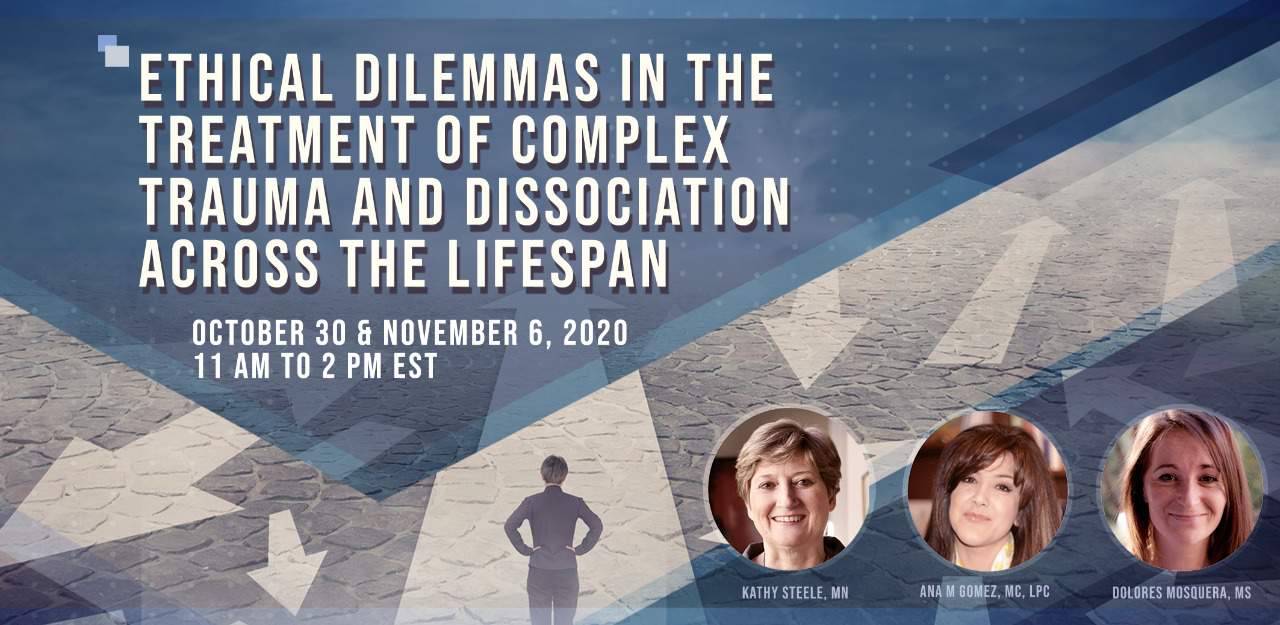

Ethical Dilemmas in the Treatment of Complex Trauma and Dissociation Across the Lifespan
October 30, 2020 @ 11:00 am - 2:00 pm EDT
- This event has passed.
This workshop explores the complicated ethical dilemmas in treating clients in different developmental stages with complex trauma and dissociation. Some clinical challenges require therapists to develop a mindful and collaborative decision-making process that considers highly complex situations. We will explore the intersection of our personal and professional ethics and its impact on our ethical decision-making. Common ethical challenges will be discussed, including reporting and confidentiality issues, involvement of parents and caregivers of children, as well as the adult client’s social supports in therapy; ongoing abuse and revictimization; ethical issues related to self-harm, suicidality, and danger to others; boundary issues; management of the therapeutic relationship and intense countertransference; ethical management of impasses; and how to address issues arising from fragmented caregiving systems and parental severance. Confidentiality issues with adults, adolescents and children will be discussed. Conversations among three experts, case examples, and didactic material will offer a lively time of learning. This training will not address the specifics of regional or national board laws and regulations but instead will focus on moment to moment decision-making skills in the face of ethical challenges arising in clients with complex clinical presentations.
Participants will be able to:
- Explore the intersection of their personal and professional ethics, and ways in which their ethical decision-making might be further developed.
- Discuss flexible guidelines that support adaptive growth in both client and therapist.
- Identify common ethical issues in the treatment of complex trauma and dissociation across the lifespan.
- Employ practical approaches to resolve specific complex ethical dilemmas in complex trauma survivors.
- Analyze the ethical use of therapeutic boundaries with clients who have experienced complex trauma.
- Examine at least two ethical dilemmas in their current caseload.
CE Information
- CE-Classes.com is the provider of CE’s.

- Licensed Professionals should contact their regulatory boards to determine course approval.
- Certificates will be awarded after completion of the workshop and will print their own certificate after registering at Ce-classes.com by entering your confirmation number or keycode and completing an evaluation form and quiz.
- There are no known conflicts of interest for these workshops.
- The American Psychological Association (APA) Ce-Classes.com is approved by the American Psychological Association to sponsor continuing education for psychologists. Ce-Classes.com maintains responsibility for this program and its content.
- The Florida Board of Clinical Social Work, Marriage and Family Therapy and Mental Health Counseling Provider #852 BAP-Expires 3/31/2021
- The California Board of Behavioral Sciences. The California Board of Behavioral Sciences, BBS, recognizes relevant course work/training that has been approved by nationally recognized certifying bodies, such as APA, to satisfy renewal requirements.
- California Consortium of Addiction Programs and Professionals (CCAPP) Provider Number OS-12-147-0221 Expires 2-2021
- The Texas Board of Social Work Examiners, Continuing Education Provider – 5674 expires 4/30/2021.
- The Texas Board of Professional Counselors, Continuing Education Provider
- Massachusetts Authorization Number: 2117
- Ohio Counselor, Social Worker and Marriage and Family Therapist Board – Provider # RCST031201 Expires 5/31/2021
- New York Social Work Board – Ce-Classes.com is recognized by the New York State Education Department’s State Board for Social Work as an approved provider of continuing education for licensed social workers #SW-0120.
Grievances must be put in writing to Info@anagomez.org or info@agateinstitute.org
ADA assistance: Please contact Jim Mason at info@anagomez.org if special accommodation is required.
